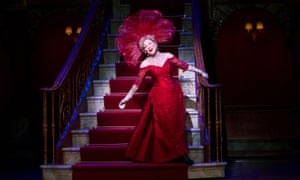The New York Times
Tony Voters Point to Tight Races and Sure Bets
By MICHAEL PAULSON
JUNE 8, 2017

Two topically daring, emotionally moving and wholly original shows, “Dear Evan Hansen” and “Come From Away,” are locked in an unusually tight race for the sought-after prize of best new musical in this year’s Tony Awards, with just hours to go before the deadline for 839 theater industry insiders to submit their ballots.
During the past few days, The New York Times interviewed 67 Tony voters about their ballots. Here’s what we learned: There is an apparent consensus about the season’s four best performances (Kevin Kline and Bette Midler, in particular, can write their acceptance speeches now), as well as the season’s best revivals (12 years after his death, August Wilson’s stature is growing ever-stronger). But Tony voters are deeply divided about the season’s new work, with the race for best new play, as well as the one for best new musical, far too close to call.
The Tonys, formally named the Antoinette Perry Awards and presented by the American Theater Wing and the Broadway League, are the biggest event of the Broadway season — the night when the industry honors the best work presented in the 41 theaters in and around Times Square, each with at least 500 seats, that make up Broadway. Voters have until 6 p.m. on Friday to submit their ballots; the ceremony begins at 8 p.m. Eastern on Sunday, and most of it will be broadcast on CBS. (Some design and writing categories are awarded off air during commercial breaks.)
The voters we interviewed, with a promise of anonymity for discussion of their secret ballots, were evenly divided between “Dear Evan Hansen,” which many called heart-wrenching but some found morally off-putting, and “Come From Away,” which many declared inspiring but some said was treacly. The dead heat makes this year’s Tony Awards strikingly different from last year’s, when the universally acclaimed “Hamilton” swept the awards as well as the box office.
Both of this year’s top contenders are unlikely subjects for musical theater: “Dear Evan Hansen,” by Steven Levenson, Benj Pasek and Justin Paul, is a fictive story about a high school student with social anxiety whose life improves when he pretends to have been friendly with a classmate who killed himself, while “Come From Away,” by David Hein and Irene Sankoff, is a true story about the encounter between small-town Canadians and thousands of airline passengers when 38 planes were diverted to Gander, Newfoundland, during the terrorist attacks of Sept. 11, 2001.
“Dear Evan Hansen,” which had previous productions at Arena Stage in Washington and Second Stage Off Broadway, has long been the awards-season favorite. It is the best-reviewed new musical this season, features a star-making performance by the 23-year-old Ben Platt and has been making more money than many thought possible for a small show about a tough subject with an unfamiliar title and no celebrities. It is playing to standing-room-only audiences, and, thanks to premium pricing, is grossing about 106 percent of its estimated weekly potential; several of those interviewed said they were particularly impressed that the show had been attracting a relatively youthful audience, always a challenge for Broadway.
“I haven’t seen a more original, beautifully produced musical in ages,” said one Tony voter. “These are the kinds of things you pray for if you know anything about musicals.”
“Come From Away,” which had pre-Broadway runs at the La Jolla Playhouse, Seattle Repertory Theater, Ford’s Theater in Washington and the Royal Alexandra Theater in Toronto, is also succeeding despite a lack of stars, a potentially off-putting connection to a traumatic event and a hard-to-understand title.
It has been selling well thanks to strong word-of-mouth and has benefited from its timing: Though it was written before Donald J. Trump became a presidential candidate, its celebration of global community and its depiction of how people can welcome strangers has been interpreted by many as an antidote to the xenophobia of the Trump era. It is also selling out most performances, although at a lower price point than “Dear Evan Hansen,” and it grossed about 90 percent of its potential last week.
“I sat there with tears in my eyes,” said one Tony voter. “It left me with a hopeful view of humanity, which I think we need right now.” Another Tony voter said, “I had the best 90 minutes of my life at that show.”
“Natasha, Pierre & the Great Comet of 1812,” which received the most Tony nominations this year, does not seem to be a significant factor in the race for best new musical; nor is the fourth nominee, an adaptation of the film “Groundhog Day.”

Neck and Neck for New Play
The spring began with anticipation of two plays by Pulitzer Prize-winning women whose work had never been presented on Broadway: “Indecent,” by Paula Vogel, and “Sweat,” by Lynn Nottage. But the race for best new play has instead come down to one between an established favorite, “Oslo,” by J. T. Rogers, and a late-opening upstart, “A Doll’s House, Part 2,” by Lucas Hnath.
Many voters love “Oslo” for its significance — it explores the little-known back story of the 1993 Middle East peace talks — and the crispness of its writing and production. But “A Doll’s House, Part 2,” a sequel to the 19th-century Ibsen play, has won many fans with its clever and periodically comedic look at the aftermath of a marital breakup.
The campaign has been lopsided. “Oslo” was produced by a nonprofit, Lincoln Center Theater, which, hamstrung by finances or strategy, has kept a low profile during the Tony season, while “A Doll’s House, Part 2,” produced by the Broadway bigwig Scott Rudin, has saturated print and broadcast outlets with attention-getting advertisements and multiple media appearances.
The voters we interviewed were evenly divided between “Oslo” and “A Doll’s House, Part 2,” and “Indecent” and “Sweat” were not far behind, meaning an upset is possible. Many voters noted that whatever happens, there is a factor to celebrate (all the nominated writers are American) and to rue (several of the plays have struggled financially).

A Consensus on Performers
By far the surest bet of the night, according to our survey, is that Mr. Kline will pick up his third Tony Award, for best performance by an actor in a leading role in a play, for his pitch-perfect portrayal of a preening stage star, Garry Essendine, in a revival of the Noël Coward comedy “Present Laughter.” Mr. Kline, who won Tony Awards in 1978 for “On the Twentieth Century” and in 1981 for “The Pirates of Penzance,” has no real competition — each of the other four nominees has a smattering of support, but Mr. Kline is the overwhelming favorite.
The other leading performance categories also seem to be largely sewn up. Ms. Midler, who first appeared on Broadway in 1967, has a three-to-one lead over her closest competitor, Patti LuPone of “War Paint,” in the race for best actress in a musical. Ms. Midler, 71, is now starring in the revival of “Hello, Dolly!” and her impeccable comic timing, combined with her unparalleled onstage charisma, has won her the support of most Tony voters.
In the race for best leading actor in a musical, Mr. Platt, of “Dear Evan Hansen,” has a two-to-one lead over Andy Karl of “Groundhog Day,” who is a well-liked Broadway star and won extra credit this season for persevering despite tearing a knee ligament. And in the race for best leading actress in a play, Laurie Metcalf, of “A Doll’s House, Part 2,” has a two-to-one lead over Laura Linney of “The Little Foxes.”
(We asked voters only about leading performers and shows, so you’ll have to wait until Sunday night for the other categories.)

Recognition for August Wilson
Tony voters really, really loved “Jitney,” the only one of August Wilson’s 10 American Century plays that had not been on Broadway before. (This production, which closed in March, was deemed a revival because it has been performed so frequently in regional theaters.) “Jitney” has three times as much support as its closest competitor, the revival of Lillian Hellman’s “The Little Foxes.” Both were produced by the same nonprofit, the Manhattan Theater Club.
And, surprising no one, Tony voters consider the current production of “Hello, Dolly!” the best musical revival of the season. The lavishly upbeat production is trouncing its two competitors for the Tony, “Falsettos” and “Miss Saigon.”






